

3 Steps to Becoming a Coding Teacher. Becoming a coding teacher doesn't need to be intimidating.
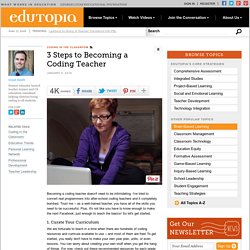
I've tried to convert real programmers into after-school coding teachers and it completely bombed. Trust me -- as a well-trained teacher, you have all of the skills you need to be successful. Plus, it's not like you have to know enough to make the next Facebook, just enough to teach the basics! So let's get started. 1. Coding Non-Linear Stories With @twinethreads. I loved “Choose your own adventure” books as a kid.
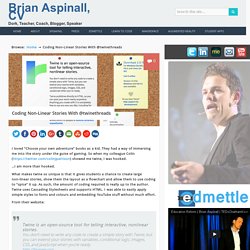
They had a way of immersing me into the story under the guise of gaming. So when my colleague Colin ( showed me twine, I was hooked. Learn to Code. Menu If you would like to see my video tutorials using Scratch, click here to access my YouTube channel. Primary: Junior: Intermediate+: Tutorials: Run Marco! The next chapters of the story are coming soon!
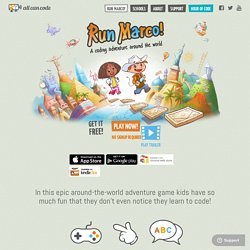
Jungle Sequence of commands, iterations, conditions Ancient Temple Variables, memory, simple data-structures (Coming Soon) Surprise! Data-structures, functions, simple algorithms. The Hour of Code. Hour of Code Suggestions by Grade Level. Hour of Code Suggestions by Grade Level. Unplugging the Hour of Code. Teaching kids to code is arguably as important to today’s youth as numeracy and literacy.
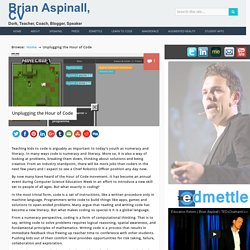
In many ways code is numeracy and literacy. More so, it is also a way of looking at problems, breaking them down, thinking about solutions and being creative. From an industry standpoint, there will be more jobs than coders in the next few years and I expect to see a Chief Robotics Officer position any day now. By now many have heard of the Hour of Code movement. It has become an annual event during Computer Science Education Week in an effort to introduce a new skill set to people of all ages. In the most trivial form, code is a set of instructions, like a written procedure only in machine language. Unplugging the Hour of Code. A Beginner’s Guide to Bringing Coding Into the Classroom. In case you haven’t been paying attention, computer science skills are vastly becoming some of the most in-demand skills of the twenty-first century.
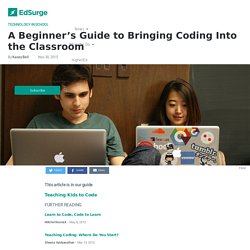
In fact, some call it a new "superpower. " But there’s a problem. There are approximately 587,000 computing jobs nationwide, which is growing at 2x the national average, but only about 38,000 computer science students graduated into the workforce this year. The U.S. Bureau of Labor Statistics predicts that by the year 2020, there will be one million more computer science jobs than graduates prepared for these jobs. Computer science is a primary driver of the U.S. economy, yet it does not (yet) play a significant role in K-12 education. My Hour of Code 2015 Collection. OK, so I’ve been poking around adding things to a Flipboard document to support the Hour of Code 2015, December 7-13.
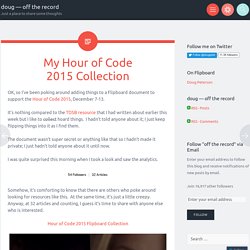
It’s nothing compared to the TDSB resource that I had written about earlier this week but I like to collect hoard things. I hadn’t told anyone about it; I just keep flipping things into it as I find them. The document wasn’t super secret or anything like that so I hadn’t made it private; I just hadn’t told anyone about it until now. I was quite surprised this morning when I took a look and saw the analytics.
Somehow, it’s comforting to know that there are others who poke around looking for resources like this. Cybraryman Internet Catalogue. Coding in the Classroom: 16 Top Resources. As cool as technology is, its intricacies and inner workings are sometimes intimidating, especially for young people who may be more interested in what technology can do for them rather than what they can do with technology.

However, when students hurdle that obstacle and see the value of computer science — specifically coding — they gain a broadened perspective and the potential for a rewarding career in the tech field. The following resources will help you teach your students the basics of coding and will provide tips on how to keep kids interested as you go. Tools to Use in Class Can you make coding fun for your students? Absolutely! Edutopia presents a list of six resources designed to help parents get their kids interested in coding.
The Facts About Coding Teaching your students to code is important, but teaching them its practical value is also key in helping them derive the most benefit from what they learn. K-5 Program. Code.org has developed an elementary school curriculum that allows even the youngest students to explore the limitless world of computing - at no cost for schools.
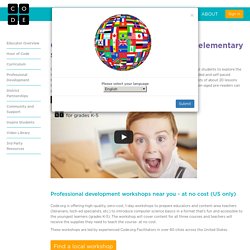
The courses blend online, self-guided and self-paced tutorials with “unplugged” activities that require no computer at all. Each course consists of about 20 lessons that may be implemented as one unit or over the course of a semester. Even kindergarten-aged pre-readers can participate. Professional development workshops near you - at no cost (US only) Code.org is offering high-quality, zero-cost, 1-day workshops to prepare educators and content-area teachers (librarians, tech-ed specialists, etc.) to introduce computer science basics in a format that's fun and accessible to the youngest learners (grades K-5).
These workshops are led by experienced Code.org Facilitators in over 60 cities across the United States. What you’ll get from this workshop (at no cost to you) Computer Science Fundamentals: Curriculum Overview. Coding for Kids Revisited. Coding on iPads – Beginner to Pro. Code and programming may not be the most important topics on the planet but it is an area of study that sufferers two major problems. one: an industry with millions of unfilled job positions and two: a world where not enough teachers feel confident to run programming projects.
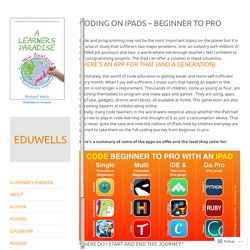
The iPad can offer a solution in these situations. There’s an app for that (and a generation) Fortunately, the world of code education is getting easier and more self-sufficient every month. When I say self-sufficient, I mean such that having an expert in the room is not longer a requirement. Thousands of children, some as young as four, are teaching themselves to program and make apps and games . Robot School App - Learn to code - www.robotschoolapp.com. Chrome Experiments - FPV Code by Karen Peng.